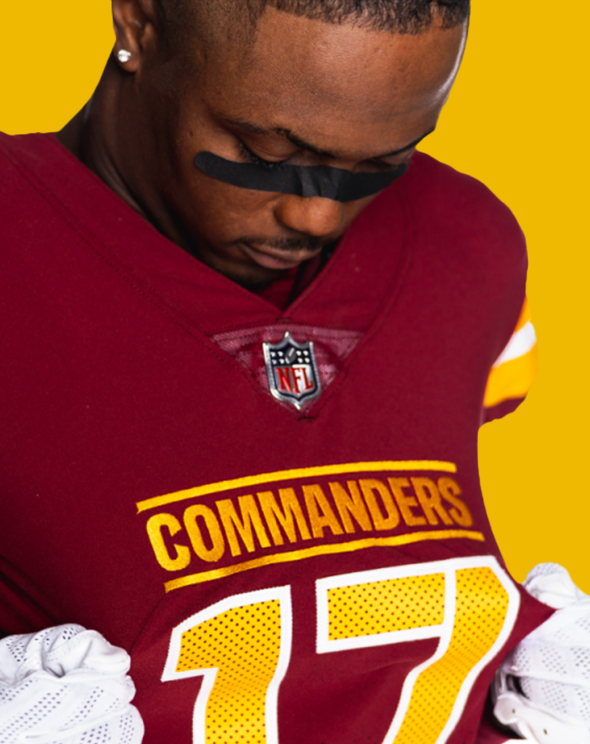This article originally appeared in The Drum.
The Washington Football Team finally announced their much-anticipated new name: the Washington Commanders. And from a professional naming perspective, they got this right.
Starting with the name, they landed on a strong one. The word itself is powerful and literally means “one who commands.” It’s also gender-neutral and culturally neutral, both ideal attributes, especially given the team’s culturally insensitive prior name.
The name also anchors the team to its hometown of Washington, D.C. For example, George Washington, for whom D.C. is named, was the commander of the Continental Army during the Revolutionary War and later served as our nation’s first Commander in Chief. The term “commander” also implicates D.C. as the command center of the country, while carrying military-inspired tone, suggesting the Pentagon.
Most importantly, the new name turns each player into a commander, taking control of the field, dominating their opponents and playing to win. The name “Commanders” sets the brand up to succeed.
It’s also important to consider the process by which the franchise arrived at the new name. When the team became the Washington Football Team in 2020, there was some talk of establishing a new moniker immediately. But rushing a name change can lead to, as they say in football, unforced errors. Thankfully, the team’s leaders decided to slow down, take time to strategize and run the process with the diligence and thoughtful consideration it deserved.
By taking its time to conduct a legitimate naming process, the team was able to include its fans in a naming contest. Fans submitted over 40,000 ideas. This resulted in a list of 1200 names for the team to consider. Besides generating a rich trove of ideas, including fans in the creative process also made fans feel excited and invested in the process. Often, including constituents in a creative process like naming tends to produce a better response to the final announcement.
The team consulted a wide variety of diverse fans, including Native American leaders, throughout its process of research on the name finalists. Including diverse voices in both the name generation process and the name vetting process is best practice for ensuring a new brand reflects and resonates with a diverse audience.
Perhaps the most important part of any rename or rebrand is the launch. A botched launch can ruin a great name. In this case, the Washington Commanders nailed it. Choosing to announce on a widely popular and friendly outlet like Today was wise as well, as the program reaches a diverse audience beyond sports fans and thereby amplifies the message.
Announcing the full Washington Commanders brand — including the new name, story and visual identity — all at once took the pressure off the name to be all things to all people. The website and social channels were ready to go with a hashtag #takecommand, inviting fans to be a part of the conversation. The brand narrative was delivered in a compelling launch video that brought all fans along on the franchise’s journey over the years. The video’s narrative ends with the powerful statement from players: “We are… the Commanders!”, emphasizing that the brand is changed. The name is in place. The new chapter has begun. The Commanders are here to stay — and they mean business.
The real measure of any rebrand is the reaction from the brand’s audience. And thus far, the reactions have been more positive than negative. Again, the positive response may be largely due to the facts that the team took its time and chose to include fans in the naming process. It’s common for rebrands and renames to elicit negative commentary. People don’t like change, and most people fancy themselves expert namers who think they could’ve done better. And there will certainly be some of those reactions to the Commanders name. By and large, however, the reception has been solid. I polled several friends before they’d heard about the announcement, and each said, essentially: “Commanders has a nice ring to it.”
First the Cleveland Guardians launched a successful rebrand and now the Commanders have followed suit. Perhaps the Kansas City Chiefs will be inspired after seeing their colleagues succeed. But it’s important to note that the work isn’t done. These name changes are a big step forward in addressing the damage that previous racist names caused. But more must be done to continue to heal and make amends for the 90 years of damage that the previous name inflicted on Native Americans.
Aaron Hall is Group Director of Naming


